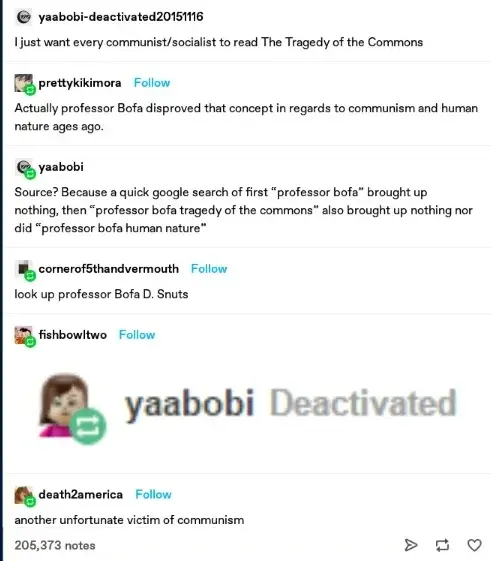this post was submitted on 02 Feb 2024
279 points (96.0% liked)
tumblr
3505 readers
4 users here now
Welcome to /c/tumblr, a place for all your tumblr screenshots and news.
Our Rules:
-
Keep it civil. We're all people here. Be respectful to one another.
-
No sexism, racism, homophobia, transphobia or any other flavor of bigotry. I should not need to explain this one.
-
Must be tumblr related. This one is kind of a given.
-
Try not to repost anything posted within the past month. Beyond that, go for it. Not everyone is on every site all the time.
-
No unnecessary negativity. Just because you don't like a thing doesn't mean that you need to spend the entire comment section complaining about said thing. Just downvote and move on.
Sister Communities:
-
/c/[email protected] - Star Trek chat, memes and shitposts
-
/c/[email protected] - General memes
founded 2 years ago
MODERATORS
you are viewing a single comment's thread
view the rest of the comments
view the rest of the comments

In all seriousness, Elinor Ostrom won the Economics “Nobel” for pretty definitively refuting the Tragedy of the Commons: https://evonomics.com/the-only-woman-to-win-the-nobel-prize-economics-debunked/
She did win a "Nobel" prize for her work, but I wouldn't say that she "refuted" the Tragedy of the Commons. It seems more like she found that it is possible to avoid the tragedy with the right systems in place. From the article:
The article goes on to say:
The key point there is that the "Tragedy" is the default, and you can only overcome it with societal norms and/or legal rules. Unfortunately, that means that a commons will often be over-exploited, which is a tragedy.
The prime example of that is the atmosphere and atmospheric CO2. There is no legal framework over the atmosphere's commons because there's no world government that can bind everyone. And, the commons is the ultimate prisoner's dilemma situation. If everyone cooperates everyone wins, but if anyone defects, the earliest to defect win the most.
So, the atmosphere is once again a terrible "commons" to govern. It doesn't have clearly defined boundaries of any kind.
More tragedy for the atmosphere. The only possible way to regulate that is a government that covers 8 billion people, because it's a commons used by 8 billion people. But, that means that external governments have to set the rules, which she found was a way that regulating commons failed, leading to tragedy.
The guy who came up with the term "The Tragedy of the Commons" seems like a pretty awful guy, and he used it to justify some pretty awful things. But, he was specifically talking about these hard-to-manage commons affecting the entire world, leading to overpopulation and a resource crunch. While Ostrom's work is encouraging in that small-scale commons can often be managed, and in some cases have been managed successfully for hundreds of years, it seems like it's still true that an unmanaged commons will be ruthlessly exploited, and that's how we're in a world where the sea level is about to rise and drown most of Florida.
I spent a considerable amount of time trying to find out what's the deez nuts joke was supposed to be with that name